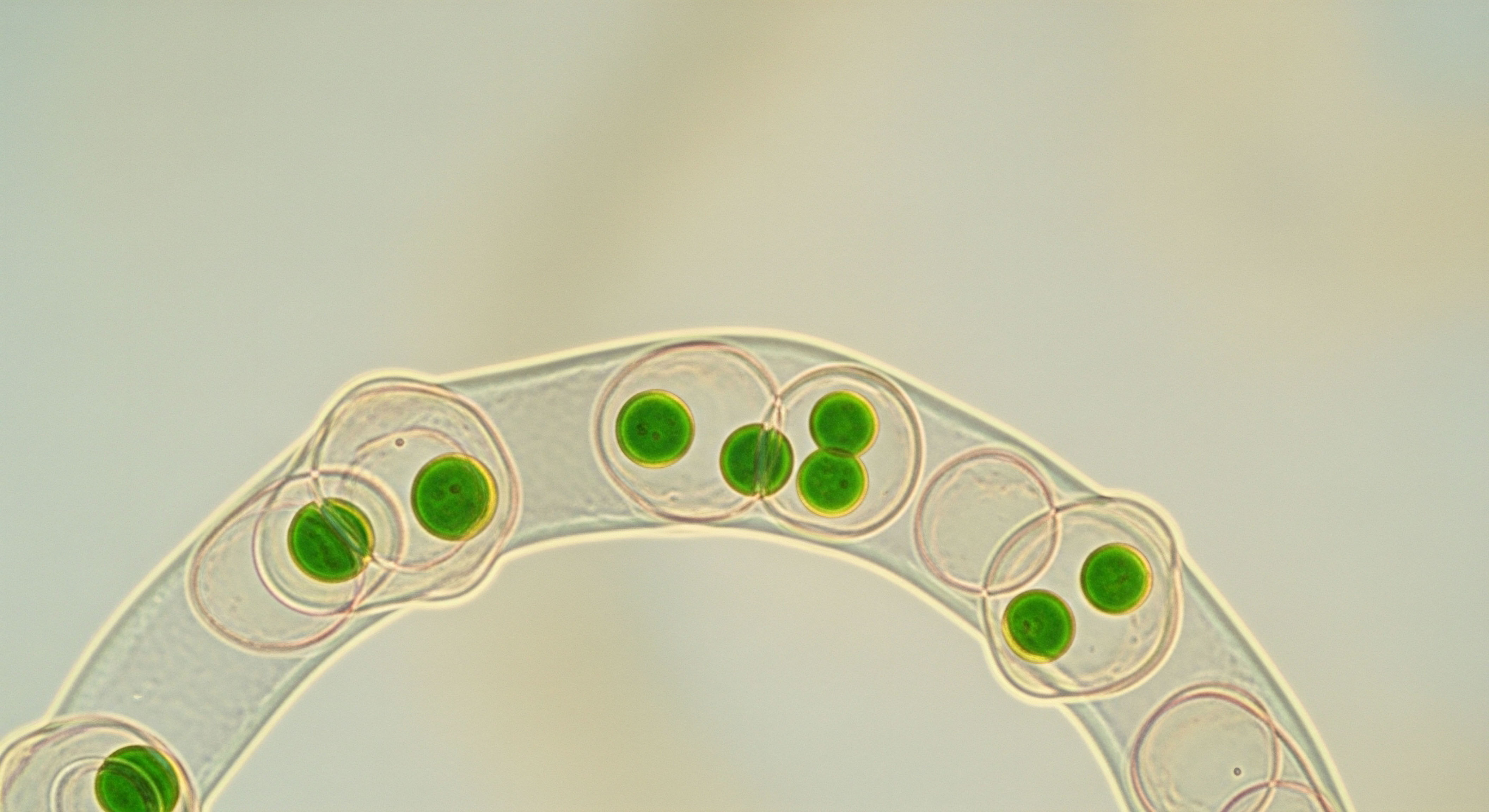

Sustaining Biological Readiness beyond IVF
The journey through in vitro fertilization represents a profound personal undertaking, often marked by a confluence of hope, anticipation, and considerable biological demand. As you navigate the intricate pathways of assisted reproduction, a natural question arises regarding the endurance of specific lifestyle adjustments post-procedure.
This inquiry extends beyond the immediate period of treatment, touching upon a deeper understanding of your body’s inherent systems and the continuous interplay of factors shaping long-term vitality. Your experience is unique, reflecting the complex adaptive capacities of human physiology, and recognizing this forms the cornerstone of our exploration.
Maintaining specific lifestyle modifications after an IVF procedure represents an investment in sustained hormonal health and metabolic equilibrium. The body’s endocrine system, a sophisticated network of glands and hormones, functions as an internal messaging service, orchestrating everything from mood to energy and reproductive capacity.
Post-IVF, supporting this system becomes a continuous process, ensuring the optimal environment for both potential pregnancy and overall well-being. These adjustments are not merely transient protocols; they constitute a foundational commitment to your biological resilience.
Sustaining lifestyle adjustments post-IVF establishes a foundation for enduring hormonal health and metabolic balance.

Understanding Your Endocrine Resilience
The endocrine system’s intricate feedback loops dictate how your body responds to internal and external cues. Following the focused hormonal interventions of an IVF cycle, the system seeks to re-establish its baseline equilibrium. Lifestyle choices directly influence this recalibration, impacting the production, transport, and reception of vital biochemical messengers. Dietary patterns, physical activity, stress modulation, and sleep architecture collectively contribute to the harmony of these systems.

The Pillars of Post-IVF Well-Being
A multi-pronged approach to lifestyle offers comprehensive support for the body after an IVF procedure. Each element plays a distinct yet interconnected role in fostering an environment conducive to ongoing health.
- Nutrient Density ∞ Prioritizing whole, unprocessed foods provides the micronutrients essential for cellular function and hormonal synthesis. A diet rich in antioxidants, healthy fats, and lean proteins supports metabolic pathways and cellular integrity.
- Mindful Movement ∞ Regular, moderate physical activity enhances blood flow, improves insulin sensitivity, and aids in stress reduction. It supports a healthy body composition, which significantly impacts hormonal regulation.
- Stress Modulation ∞ Chronic stress elevates cortisol levels, which can disrupt the delicate balance of reproductive hormones. Implementing practices like deep breathing or gentle yoga helps regulate the body’s stress response.
- Restorative Sleep ∞ Adequate, high-quality sleep is indispensable for hormonal regulation and cellular repair. It directly influences the circadian rhythms that govern numerous physiological processes, including those relevant to reproductive health.


Optimizing Endocrine Function after Reproductive Intervention
Following an IVF procedure, the strategic application of lifestyle adjustments transitions from an immediate supportive role to a sustained commitment, shaping the body’s ongoing endocrine and metabolic landscape. The ‘how’ and ‘why’ behind these sustained practices lie in their capacity to reinforce the body’s intrinsic regulatory mechanisms, which may have experienced significant perturbation during fertility treatments. This continuous engagement with personalized wellness protocols aids in stabilizing the hypothalamic-pituitary-gonadal (HPG) axis and mitigating potential metabolic shifts.
Progesterone supplementation often continues for a specific duration post-embryo transfer, a critical element in maintaining early pregnancy. This exogenous support typically extends until the placenta assumes its role in producing sufficient progesterone, generally occurring around 8 to 12 weeks of gestation. Individual clinical guidance remains paramount, as specific circumstances or prior history may necessitate a modified duration. This temporary hormonal bridge ensures the uterine lining remains receptive and supportive for the developing embryo.
Progesterone supplementation typically continues for 8-12 weeks post-transfer, ensuring uterine support until placental hormone production.

Targeted Lifestyle Interventions for Post-IVF Metabolism
The metabolic impact of IVF therapies, including potential alterations in glucose and insulin dynamics, underscores the long-term relevance of dietary and activity patterns. Sustained attention to nutrition helps normalize these metabolic markers, reducing inflammation and supporting overall cellular health. A dietary approach emphasizing whole foods, such as a Mediterranean-style pattern, provides a rich array of antioxidants and anti-inflammatory compounds, which benefits reproductive health and systemic well-being.

Sustaining Hormonal Equilibrium through Lifestyle
The integration of specific lifestyle elements into a long-term wellness protocol offers a powerful strategy for maintaining post-IVF hormonal balance.
| Lifestyle Aspect | Physiological Impact | Long-Term Benefit Post-IVF |
|---|---|---|
| Balanced Nutrition | Stabilizes blood glucose, reduces inflammation, provides micronutrients for hormone synthesis. | Supports metabolic resilience, optimizes reproductive hormone pathways, enhances overall cellular health. |
| Moderate Exercise | Improves insulin sensitivity, increases circulation, aids in healthy weight management. | Maintains hormonal regulation, reduces cardiovascular risk, supports mood and energy levels. |
| Stress Management | Lowers cortisol, balances HPA axis, reduces sympathetic nervous system overactivity. | Protects HPG axis function, mitigates negative impacts on ovulation and reproductive function. |
| Quality Sleep | Regulates circadian rhythms, supports hormone production, facilitates cellular repair. | Optimizes reproductive hormone secretion, improves immune function, enhances mental clarity. |
| Toxin Avoidance | Minimizes exposure to endocrine-disrupting chemicals. | Reduces epigenetic modifications that can negatively affect fertility and offspring health. |

Beyond the Initial Phase ∞ A Continuous Horizon
The period following an IVF procedure extends beyond the immediate weeks of confirmation; it encompasses a broader horizon of health. This perspective acknowledges that the body’s systems, particularly the endocrine and metabolic frameworks, continuously adapt. Lifestyle choices made in the months and years following IVF influence future reproductive health, overall longevity, and the intergenerational transfer of well-being through epigenetic mechanisms.
Therefore, the commitment to these specific lifestyle changes becomes a continuous endeavor, adapting as individual needs and life stages evolve.


Epigenetic and Metabolic Trajectories in Post-IVF Wellness
The profound biological journey through an IVF procedure extends its influence into the very fabric of cellular regulation, necessitating a deep understanding of long-term lifestyle engagement. This academic exploration moves beyond immediate outcomes, focusing on the epigenetic and metabolic trajectories that define sustained wellness and reproductive health post-IVF.
The body’s capacity for adaptive plasticity, particularly within the endocrine and metabolic systems, dictates the duration and intensity of lifestyle commitment. This involves an intricate dance between genetic predispositions and environmental cues, where lifestyle acts as a potent modulator of gene expression.
Epigenetic mechanisms, including DNA methylation and histone modifications, represent the dynamic interface through which lifestyle factors sculpt gene activity without altering the underlying DNA sequence. Post-IVF, the sustained adoption of nutrient-dense dietary patterns, regular physical activity, and effective stress mitigation protocols can positively influence these epigenetic marks.
This has implications not only for the individual’s ongoing health but also for the germline epigenome, potentially impacting the health phenotype of future generations. The optimization of these cellular regulatory processes forms a critical aspect of long-term biological recalibration.
Lifestyle choices after IVF dynamically influence epigenetic marks, shaping long-term health and potentially impacting future generations.

Mitochondrial Dynamics and Cellular Bioenergetics
At the cellular level, metabolic function post-IVF is intimately linked to mitochondrial health. Mitochondria, the cellular powerhouses, generate adenosine triphosphate (ATP) essential for all physiological processes, including hormonal synthesis and reproductive cell viability. Lifestyle factors such as diet composition, particularly the balance of macronutrients and the presence of specific micronutrients like CoQ10, directly impact mitochondrial biogenesis and efficiency. Sustained adherence to anti-inflammatory and antioxidant-rich diets supports mitochondrial integrity, thereby enhancing cellular bioenergetics and systemic resilience.

The Interplay of HPG and HPA Axes Post-Intervention
The hypothalamic-pituitary-gonadal (HPG) axis, central to reproductive function, and the hypothalamic-pituitary-adrenal (HPA) axis, governing stress response, exhibit profound interconnectedness. Chronic allostatic load, often exacerbated by the emotional and physical demands of infertility and IVF, can lead to HPA axis dysregulation. This sustained activation results in elevated glucocorticoid levels, which can suppress GnRH pulsatility and subsequently impair LH and FSH secretion, thereby dampening gonadal function.
Long-term lifestyle interventions, particularly those focused on stress reduction and sleep optimization, aim to restore coherence between these axes. Techniques such as mindfulness-based stress reduction (MBSR) demonstrate capacity to modulate HPA axis activity, reducing cortisol output and supporting a more physiological HPG axis rhythm. This sustained neuroendocrine balance is critical for maintaining ovarian and testicular function, even after the acute phase of IVF.
| Biomarker Category | Specific Markers | Lifestyle Influence | Clinical Significance Post-IVF |
|---|---|---|---|
| Metabolic Health | HbA1c, Fasting Insulin, HOMA-IR, Lipid Panel (HDL, LDL, Triglycerides) | Dietary composition (low glycemic load, healthy fats), regular physical activity. | Indicates glucose homeostasis and insulin sensitivity, crucial for sustained endocrine balance and reduced risk of metabolic complications. |
| Inflammation & Oxidative Stress | hs-CRP, Oxidized LDL, F2-Isoprostanes | Antioxidant-rich diet, omega-3 fatty acids, stress reduction. | Reflects systemic inflammatory burden, which can negatively impact cellular health and reproductive tissue integrity. |
| Neuroendocrine Balance | Salivary Cortisol Rhythm, DHEA-S, Sex Hormones (Estradiol, Progesterone, Testosterone) | Stress management techniques, sleep hygiene, targeted nutritional support. | Assesses HPA and HPG axis function, vital for mood stability, energy, and ongoing reproductive capacity. |
| Epigenetic Modifiers | Global DNA Methylation, Specific Gene Methylation Patterns (e.g. related to reproductive genes) | Folate and B-vitamin intake, environmental toxin avoidance. | Reveals the impact of environment and lifestyle on gene expression, influencing cellular function and intergenerational health. |

The Horizon of Continuous Self-Optimization
The commitment to lifestyle changes post-IVF transcends a mere temporary adherence; it evolves into a continuous process of self-optimization. This journey recognizes the dynamic nature of human biology and the profound influence of daily choices on cellular health, hormonal signaling, and metabolic efficiency.
Understanding these underlying biological mechanisms empowers individuals to make informed decisions, actively participating in the orchestration of their long-term vitality. The ultimate goal involves fostering an internal environment of robust health, supporting not only current well-being but also future reproductive potential and overall longevity.

References
- Urata, Y. Harada, M. Komiya, S. et al. (2024). Lifestyle and fertility-specific quality of life affect reproductive outcomes in couples undergoing in vitro fertilization. Frontiers in Endocrinology, 15, 1346084.
- Wang, H. et al. (2025). Does Metabolic Status Associate With IVF Outcomes in Women Within Similar Body Mass Index Category ∞ Evidence From a Large Cohort Study. Journal of the Endocrine Society.
- Coussa, J. et al. (2020). Effects of IVF therapies on metabolic, endocrine and inflammatory status in IVF-conceived pregnancy. Clinical Endocrinology, 93(3), 294-303.
- Urata, Y. Harada, M. Komiya, S. et al. (2024). Lifestyle and fertility-specific quality of life affect reproductive outcomes in couples undergoing in vitro fertilization. Frontiers in Endocrinology, 15, 1346084.
- Bavishi Fertility Institute. (2025). Lifestyle Changes to Boost IVF Success for a Healthy Pregnancy. Retrieved from search results.
- Inito Blogs. (2024). Progesterone shots for IVF ∞ Timing, side effects, dosage and more. Retrieved from search results.
- Fertility & Reproductive Medicine Center. (2019). Progesterone and IVF ∞ So why do I need this? Retrieved from search results.
- Number Analytics. (2025). Reproductive Endocrinology and Stress. Retrieved from search results.
- TRIO Fertility. (2024). Optimizing Your Diet for IVF Success ∞ What to Eat When TTC. Retrieved from search results.
- News-Medical. (2024). New study reveals lifestyle factors boosting IVF success. Retrieved from search results.

Reflection
The knowledge acquired regarding post-IVF lifestyle adjustments serves as a compass, guiding you toward a deeper connection with your own physiological narrative. This understanding empowers you to approach your health not as a series of isolated events, but as a continuous, integrated process.
The insights gained represent an initial step, illuminating the profound impact of daily choices on your hormonal symphony and metabolic resilience. Your path to sustained vitality and function unfolds with each conscious decision, affirming a personalized approach to enduring well-being.

Glossary

lifestyle adjustments

long-term vitality

metabolic equilibrium

specific lifestyle

physical activity

stress modulation

nutrient density

insulin sensitivity

stress reduction

reproductive health

cellular health

lifestyle changes

lifestyle factors

biological recalibration

cellular bioenergetics

metabolic function

hpa axis




